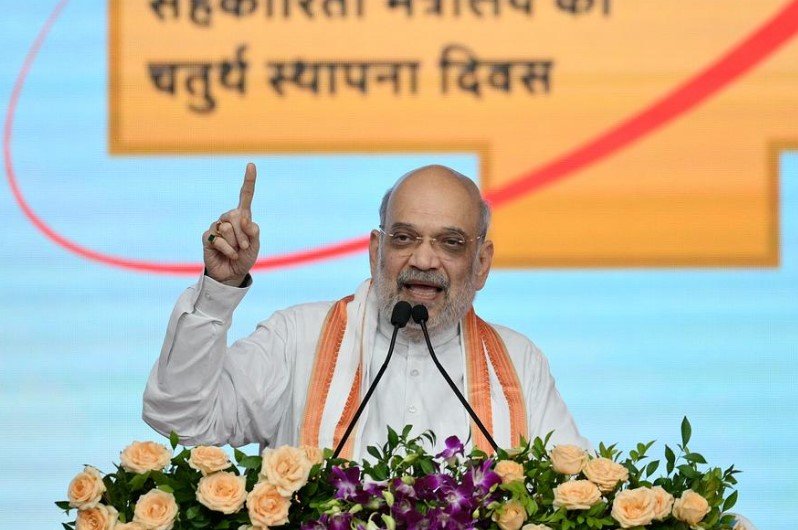Amit Shah on Sunday unveiled two major cooperative initiatives in Gujarat — a new dairy federation and a salt cooperative — both aimed at uplifting farmers and rural workers.
At a grand event in Anand, the home turf of India’s dairy revolution, Union home and cooperation minister Amit Shah announced the launch of the Sardar Patel Cooperative Dairy Federation and the Kutch District Salt Cooperative Society. These, he said, would offer a more structured, fair and sustainable model for milk and salt producers — much like what Amul has done for decades.
A Nod to History, a Push for the Future
Standing on the grounds of Amul Dairy, Amit Shah invoked the legacy of Sardar Vallabhbhai Patel and Verghese Kurien. The event was not only about new beginnings but also marked the 150th birth anniversary year of Sardar Patel and four years of the Ministry of Cooperation, which Shah heads.
“Like Amul revolutionized the lives of lakhs of dairy farmers, this new federation will ensure that milk producers across the country — especially in Gujarat — get the right price and recognition,” he told a packed crowd.
The symbolism of the venue was not lost on anyone. Anand, the birthplace of Amul, has long been at the heart of India’s cooperative movement. Shah’s remarks echoed the sentiments of rural empowerment and local enterprise that the place represents.

What the Dairy Federation Promises
The newly minted Sardar Patel Cooperative Dairy Federation is not just another layer on top of Amul. It’s intended to be a multi-state platform that builds on Amul’s cooperative success while widening its reach and refining its fairness to producers.
The goals laid out by Shah were simple but ambitious: organized procurement, fair pricing for farmers, more transparency in operations, and a “circular economy” that keeps profits and value within rural communities.
According to Shah, “This model will integrate producers directly into the value chain — no middlemen, no exploitation.” He also emphasized it wasn’t a competitor to Amul but a complementary structure to extend the cooperative model into regions where Amul’s presence may not be strong.
Just one sentence: It’s a big bet on self-sufficiency.
Salt Workers Finally Get Their Due
Shah’s second announcement — the formation of the Kutch District Salt Cooperative Society — struck a particularly emotional chord.
Salt workers, or Agariyas, toil in extreme conditions in the Rann of Kutch to produce nearly 70% of India’s salt. Yet, for years, they’ve operated under informal setups, with little security or bargaining power.
Now, for the first time, these workers will have a registered cooperative of their own.
Here’s what the salt co-op will provide:
-
Collective bargaining on salt pricing
-
Credit support and equipment financing
-
Health insurance and social security tie-ups
-
Direct access to larger buyers without agents
“This has been pending for decades,” said Shah. “The Agariyas deserved a structured system that respects their labor.”
The Numbers Behind Gujarat’s Dairy and Salt Economy
These sectors are more than sentimental. They’re economic powerhouses. Let’s look at a quick comparison:
| Sector | Annual Output (Gujarat) | National Contribution | Workforce Impact |
|---|---|---|---|
| Dairy | 15 million tonnes | ~20% | ~3 million farmers |
| Salt | 25 million tonnes | ~70% | ~1.2 lakh Agariyas |
The government sees these cooperatives as levers to deepen India’s rural resilience while plugging gaps in long-unorganized sectors.
Mixed Reception, but Hope in the Air
While supporters of the move hailed it as a game-changing moment for cooperatives, some critics noted the risks of “over-bureaucratization.”
“There’s always the danger that adding more layers might actually slow things down. Let’s hope it doesn’t,” said an official with a private dairy firm.
Still, in the audience, many farmers and Agariyas looked genuinely hopeful. Rameshbhai, a 52-year-old salt worker from Kharaghoda, said he was attending his first government event in years. “If this society really helps us get loans and sell our salt at good rates, it will be the first time anyone’s remembered us,” he said.
And that optimism was visible.
Shah’s Political Calculus?
Amit Shah’s double rollout in Gujarat isn’t just about economics. It’s smart politics, too.
By aligning both initiatives with Sardar Patel’s birth anniversary, and by choosing Anand — the political and cooperative heart of Gujarat — Shah is reinforcing the BJP’s narrative of grassroots nationalism.
Not to mention, Gujarat faces Assembly elections in 2027. With these moves, Shah is already laying groundwork among the rural voter base.
But it wasn’t just about optics. His speech had notes of sincerity, especially when he recalled how Patel envisioned “a nation held together not just by borders but by the dignity of its people.”
A Cooperatives-First Vision for Rural India
The Ministry of Cooperation is still young, having been set up in 2021. Critics once dismissed it as a redundant body. But Sunday’s twin launches suggest that Shah has a long-term vision for this portfolio — and it’s deeply tied to India’s rural identity.
With cooperative dairies and now cooperative salt societies, the ministry is quietly stitching together a model that prioritizes self-reliance and shared ownership — at a time when rural India is still recovering from COVID disruptions and inflation.
“It’s not charity, it’s about giving people control over their own futures,” Shah said near the end of his address.
That line may just end up defining the cooperative movement’s next big chapter.
